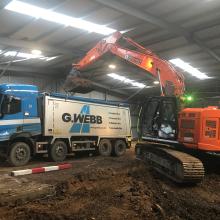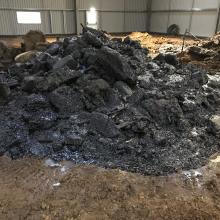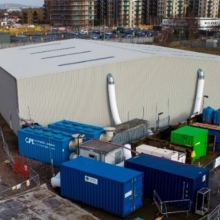Image set

Related services
Opening article section
Article section
Lead
Rich text
Approach
The client required the remediation of a large tar tank as part of its environmental commitments for the site of a former larger gasworks that were demolished in the 1960s.
A 28m x 28m, ~2.3m deep concrete tank contained 1.5m of highly odorous tarry backfill and was located immediately adjacent to sensitive gas equipment that supplied a large part of the Southeast.
Englobe undertook a limited site investigation to develop the understanding of the nature, handling characteristics and waste classification of the tank contents. This data was used to develop a remedial solution to remove the contents of the tank from site while minimising direct disposal to landfill and control and limit vapours generation and potential odour nuisance.
In a UK first, Englobe designed a bespoke enclosure to fully contain the tank whilst enabling safe plant working and lorry loading undercover, with an air management system complementary to the enclosure size. The steel framed portal enclosure was cantilevered on the northern elevation as no foundations could be built due the main power supply and telemetry for the gas infrastructure. The enclosure was clad using industrial panels including transparent sections so that the works could be viewed without entering. Expanding foam was used to seal any air gaps.
Englobe designed, built and installed the air extraction system, which could recover air at 64,000m³/hr, a maximum of eight times the enclosure volume. The system comprised two blowers, each exhausting to dedicated 16m³ activated carbon filtration units.
The two blowers and a back-up generator gave the ability to manage odours and vapour in the event a blower or the main generator failed.
Content
Carousel
Image set

Image set

Image set

Article section
Rich text
Challenge
In the locality of the site, negative public perception of remediation works was a potential issue. The local community had experienced other projects and their concerns had led to local and national news profile, and political interest at local and parliamentary level.
The local council had indicated that they would be unlikely to consent to any remediation which could be perceived as having a negative impact on air quality or cause a nuisance to the community. Based on their concerns, the client developed KPIs that the remediation would have to meet:
- Must meet planning and Regulator requirements
- No discernible odours and vapour impact at the site boundary
- No complaints from the community
- No negative feedback from the Regulators and Council.
Risk was managed by:
- Englobe agreed with the local authority site boundary targets for ambient air based on UK guidelines for the anticipated volatile organic contaminants, principally BTEX.
- The enclosure and control measures made a very significant reduction in emissions and kept the boundary vapour levels to an average of 0.02ppm total vapour and speciated concentrations to below the proposed thresholds. Odour levels at the site boundary were not significant and outside the site boundary, there were no odours.
- The excavated tank contents were loaded with the enclosure and transported offsite in specialist sludge lorries with sealed tipper bodies rather than using standard sheeted wagons. This was done to minimise the risk of odours being released during transport. Vehicle movements were deliberately routed to avoid movements close to housing.
- The tank was completely emptied over six weeks with residents and stakeholders kept fully informed by email bulletins, letter drops and a project website. Weekly emissions monitoring reports were sent to the local authority.
Rich text
Impact
The remediation solution for the site met the agreed boundary criteria, there were no complaints during the execution of the works and the works were completed without incident.
In addition, the works facilitated potential reuse of a piece of land severely impacted with contamination, soils were reused where possible and the tank was backfilled principally with recycled material.
Statistic
Rich text
The use of the enclosure protected the local community from potentially harmful emissions and maintained local air quality despite the grossly impacted nature of material being remediated.
Contract Start Date: June 2020
Completion date: March 2021
Contract Value: £1.7m